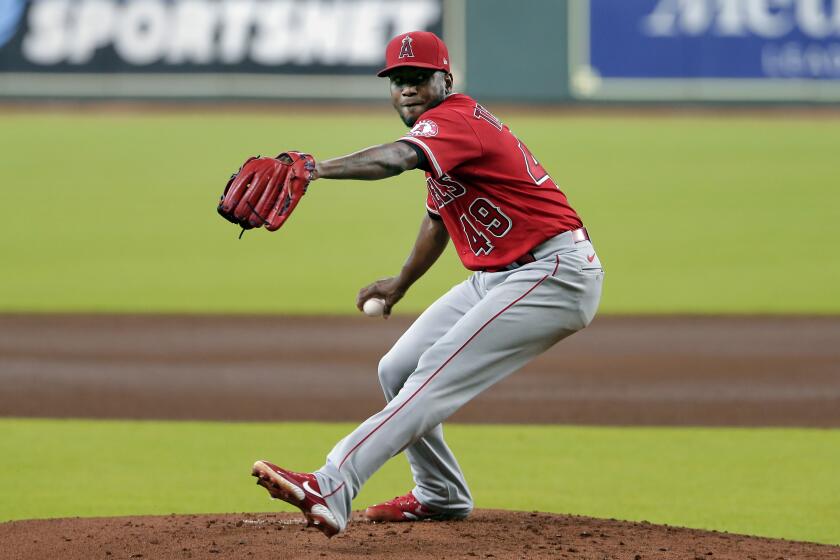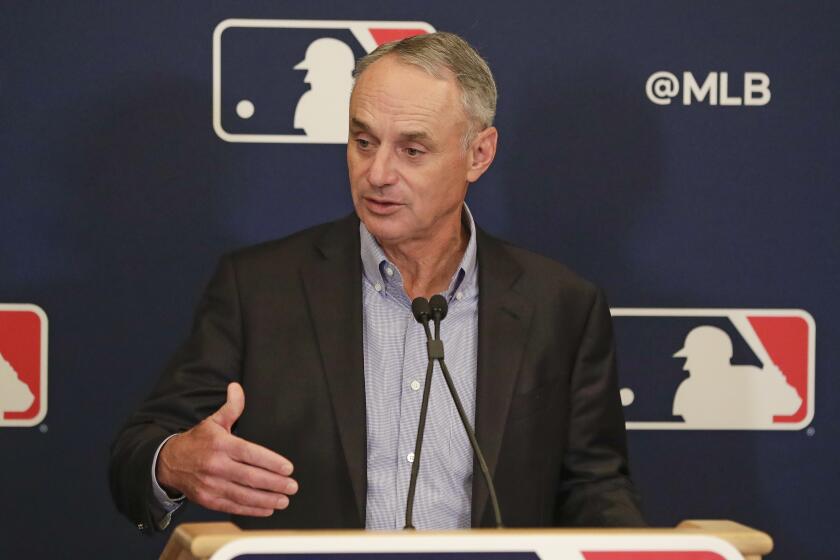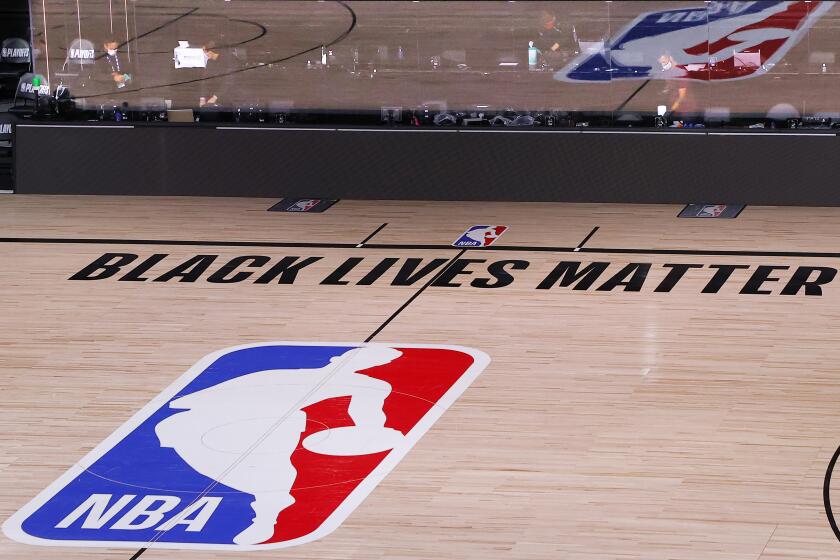Too late for Billy Eppler? Woeful pitching, rough tenure has Angels GM on thin ice
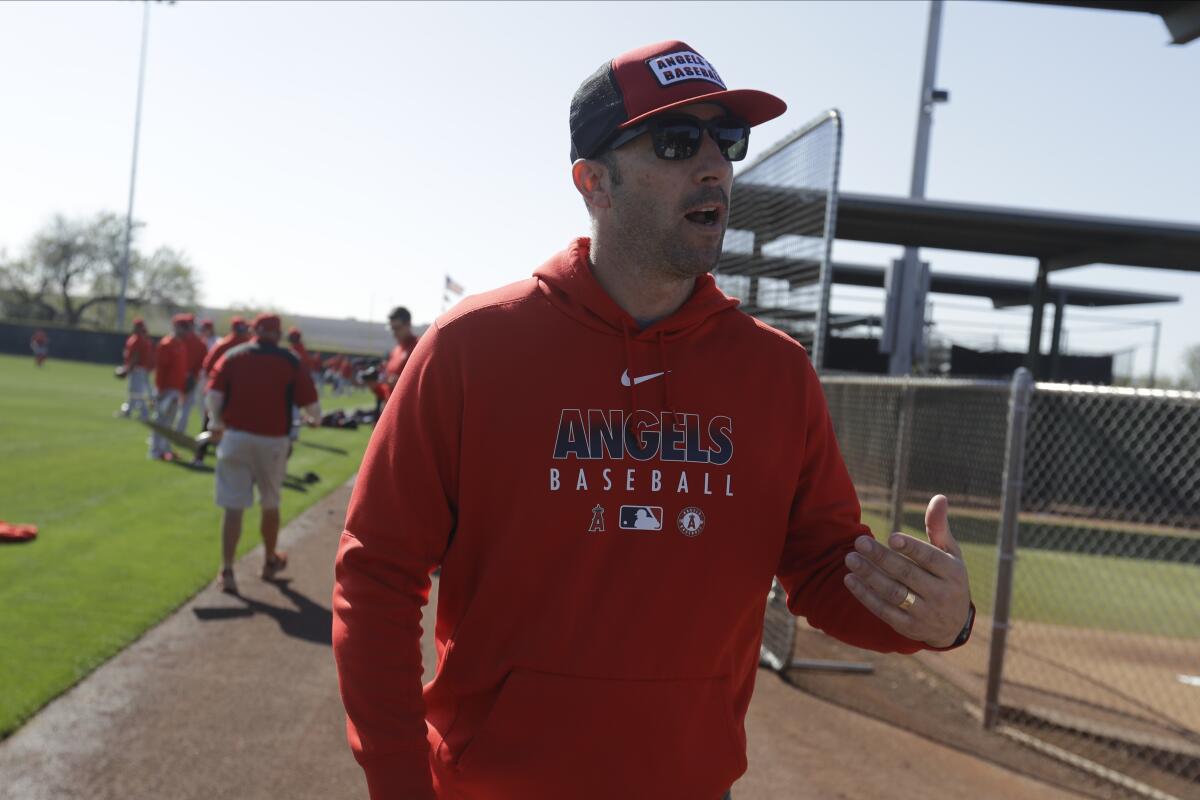
- Share via
Right in the middle of another lost season, Angels manager Joe Maddon asked Mike Trout to lead off the second game of a doubleheader.
Trout had just extended a slump to 0-for-15. The Angels, fresh off their 22nd defeat in this 60-game season, stood to lose nothing from a shakeup.
“I just thought the rearranging of the deck chairs might help,” Maddon said Tuesday after the Angels secured their third victory in 13 games.
But changing Trout’s position in the batting order seems as futile as moving furniture on a sinking ship. Unless the Angels solved their pitching woes during the two-day break provided by Hurricane Laura’s impact on the Gulf Coast, the outlook for the second half of the season will continue to be bleak.
General manager Billy Eppler entered this season as a lame duck, feeling pressure to field a contender in the last year of his contract. Now Monday’s trade deadline is approaching and the Angels aren’t buyers.
Again.
Eppler will spend the next few days fielding calls and trying to ensure the long-term viability of the team. All while coming to grips with the probability that nothing he does will save his job.
The Angels split a doubleheader against the Houston Astros.
“I just try to approach everything with a vision of how to continue to keep this organization well-positioned,” he said by phone Wednesday. “Control the controllable and do your job. Try to keep it simple. Start thinking about too much, then you get caught up in the fog.”
Angels owner Arte Moreno declared vaguely in February, before the coronavirus outbreak struck the U.S., that Eppler had to satisfy “a lot of pieces” to receive a new deal. Then Moreno specified one thing: “As a group, we need to win.”
Eppler, hired in October 2015, has never celebrated a winning record in Anaheim — or even a .500 finish. Barring a miracle, Trout and the Angels will miss the postseason for a sixth year despite an expanded playoff field.
How is that possible?
Eppler did not address the Angels’ biggest weakness — starting pitching — with a long-term solution last winter. Rather than commit $80 million over four years to former Dodger Hyun-Jin Ryu or take a $55.5-million, three-year chance on former Cy Young award winner Dallas Keuchel, Eppler traded four minor leaguers to the Baltimore Orioles for two years of former first-rounder Dylan Bundy. A few weeks later, he made a high-risk, low-cost deal with free-agent Julio Teheran (one-year, $9 million).
Thwarted in their attempts to lure free-agent ace Gerrit Cole, the Angels hoped the addition of slugger Anthony Rendon to a lineup that included Trout and Shohei Ohtani would provide enough offense to compensate for their pitching deficiencies.
Not so. The offense has been spotty. Hitters have generated power with 46 homers, the sixth-most in baseball, but they are roughly league-average in other major categories.
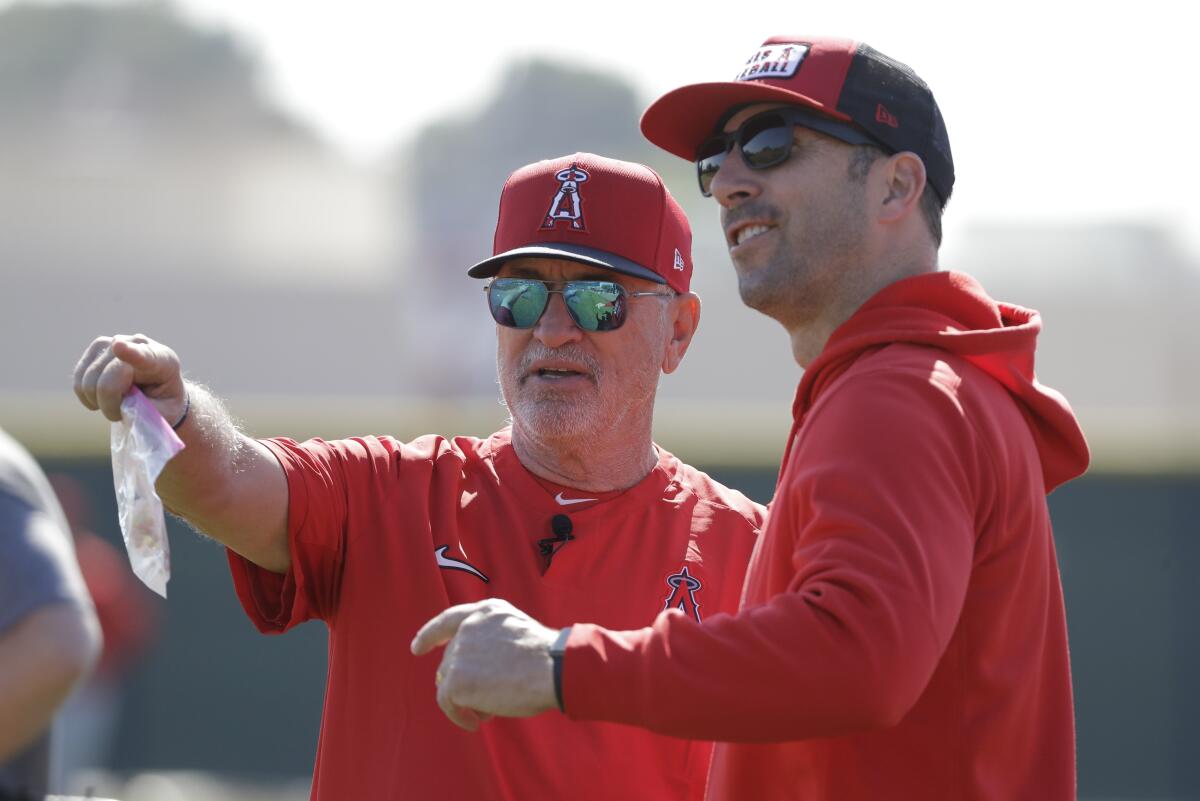
And their .241 average with runners in scoring position isn’t enough to compensate for a pitching staff that entered Thursday ranked 28th in baseball with a 5.41 ERA.
The resurgence of Bundy, whose 1.3 wins above replacement ranks 12th among all pitchers, is overshadowed by the lackluster performances of youngsters Griffin Canning, Patrick Sandoval, Jose Suarez and veterans Teheran and Andrew Heaney. Two-way player Ohtani was expected to stabilize the rotation but a forearm injury after two starts relegated him to designated hitter for the rest of the season.
Injuries to key players have marred Eppler’s tenure in Anaheim. So have the overdose death of Tyler Skaggs and a score of free-agent busts. In the latter category: pitchers Matt Harvey ($11 million), Trevor Cahill ($9 million) and Cody Allen ($8.5 million), and infielder Zack Cozart (three years, $38 million).
“With free agency, you know that if you enter into the one-year domain, you’re playing with the deck stacked against you,” Eppler said. “That’s the reason they’re one-year deals. You’re sitting at a table at a game that doesn’t have as good of odds. That’s not specific to us. That’s everywhere.
“If you lay everything out, the one-year deals are just gonna have a lower hit rate.”
Then there is Justin Upton, whom Eppler acquired while the Angels were jockeying for a wild-card spot in late 2017. The outfielder in 2018 provided the power for which he was awarded a five-year, $106-million contract but injuries spoiled his follow-up. Now he’s in a platoon and batting .099 with a .392 OPS.
MLB commissioner Rob Manfred spoke to The Times about topics including the 2020 season, eliminating minor league teams, blackout rules and his reputation.
Eppler’s inability to sign or develop front-line starting pitchers combined with Moreno’s affinity for high-priced sluggers have left the Angels with a franchise-record payroll top heavy in position players (about $145 million, with $116 million for Trout, Rendon, Upton and Albert Pujols) and light on pitchers (about $32 million).
Eppler deserves credit for locking up Trout to a 12-year, $426.5-million contract in 2019, winning a high-stakes recruiting battle for Ohtani before 2018 and trading for Gold Glove shortstop Andrelton Simmons ahead of the 2016 season. The December 2016 trade for catcher Martin Maldonado produced a Gold Glove and the bargaining chip Eppler exchanged for Sandoval in July 2018.
He also acquired solid bullpen pieces such as Ty Buttrey, Hansel Robles and Felix Peña and position players Tommy La Stella and Brian Goodwin at low cost.
Eppler’s performance in the trade market probably won’t be enough to get him a new deal from Moreno.
Eppler’s challenge upon arrival in Anaheim was to replenish the minor leagues without sacrificing the team’s ability to pose a threat in the American League West. He got part of the way there, drafting the likes of Canning, Jo Adell and Reid Detmers. The progress of the farm system ultimately helped the Angels land Rendon and extend Trout, who lauded Eppler’s efforts on the day he signed his historic contract.
But Eppler’s ability to significantly improve the team’s present was limited.
Athletes in the NBA, WNBA, MLB, MLS, NFL, NHL and professional tennis refused to take part in scheduled events in protest of the shooting of Jacob Blake.
“I took the path of not taking too many risks that could damage the club outlook for a lot of years in the future,” he said. “You see the models where they strip the club down to the foundation, but that wasn’t something we wanted do here. You also had to consider, at that moment in time, if we did that, what would that have signaled to Mike?”
This approach has left the Angels in a purgatorial loop. They behave as though they’re a few moves away from World Series contention — thus, the splurge on pricey hitters and refusal to embark on a total rebuild — but are nowhere close.
The method predates Eppler. Jerry Dipoto, under Moreno’s direction, signed Pujols to a 10-year, $240-million deal in December 2011 and outfielder Josh Hamilton to a five-year, $125-million deal the next winter. The moves forced the Angels to constantly scrimp on pitching.
Eppler inherited the mess. And if he’s not retained, his successor will inherit another.
Free-agent contracts to pitchers of $45M to $100M since November 2015:
Jeff Samardzija, San Francisco Giants, 5 yrs/$90M (2016-20): In the two seasons before signing a lucrative deal as a 30-year-old, Samardzija made an average of 32 starts and showed encouraging run-prevention trends for three teams. Injuries claimed most of his 2018 season and landed him on the injured list this season, but he has produced 7.2 WAR and a 99 ERA+ in 650⅔ innings for the Giants.
Madison Bumgarner, Arizona Diamondbacks, 5 yrs/$85 M (2020-24): Bumgarner was a force for the Giants in his 20s, compiling a 120 ERA+ during 10 seasons in San Francisco. By the end of his tenure, his strikeout rate had steadily declined. Meanwhile, the percentage of line drives and hard contact he allowed had started to climb.
Hyun-Jin Ryu — Toronto Blue Jays, 4 yrs/$80 M (2020-23): Ryu provided 13.5 WAR during seven seasons and emerged as a Cy Young Award contender in 2019, when his 2.32 ERA and 1.2 walks per nine innings led the majors. The only knock against him in free agency was his age (entering his 33-year-old season) and injury history.
Mike Leake, Arizona Diamondbacks, 5 yrs/$80 M (2016-20 + one-year option): Leake, who opted out of the 2020 season, posted a 97 ERA+ and made an average of 31 starts the last four years. The veteran of 10 seasons has been traded twice during the lifetime of his contract, each time to teams on the edges of a postseason race.
Jake Arrieta, Philadelphia Phillies, 3 yrs/$75 M (2018-22): Arrieta won a Cy Young Award and had a 151 ERA+ while averaging 30 starts during four seasons with the Cubs from 2014-17. Despite a pedestrian 2019 in Philadelphia, he has continued to pitch effectively (101 ERA+, 4.3 WAR) despite a diminished strikeout rate and a steady increase in opponents’ hard-hit percentage.
Nate Eovaldi, Boston Red Sox, 4 yrs/$68 M (2019-22): An extensive injury history kept Eovaldi from making a significant impact at the MLB level until 2018, when he posted a 3.81 ERA and 2.2 WAR in his first season back from August 2016 Tommy John surgery. He was pivotal to Boston’s run to the 2018 World Series. Since choosing to remain with the Red Sox, he has pitched only 102 innings and posted an 85 ERA+.
Alex Cobb, Baltimore Orioles, 4 yr/$57 M (2018-21): Cobb posted career highs in wins (12) and innings pitched (179⅓) as a 29-year-old in 2017 but lingered on the free-agent market until the final week of spring training 2018. Pitching for 100-loss teams in Baltimore, he has been worth 1.4 WAR and has compiled an 85 ERA+. He provided most of his value in 2018; injuries limited him to three starts in 2019.
Dallas Keuchel, Chicago White Sox, 3 yr/$55.5 M (2020-23): Keuchel won the 2015 Cy Young Award, four Gold Gloves and a World Series during seven seasons with the Astros. His first foray into free agency lasted until June 2019 but he improved his market value during a half-season in Atlanta in ’19. Before signing with the White Sox, he had a career ERA+ of 108 and averaged 28 starts per year. But a gradual increase in opponents’ hard-hit percentage and a decline in his strikeout rate were of concern.
More to Read
Go beyond the scoreboard
Get the latest on L.A.'s teams in the daily Sports Report newsletter.
You may occasionally receive promotional content from the Los Angeles Times.
